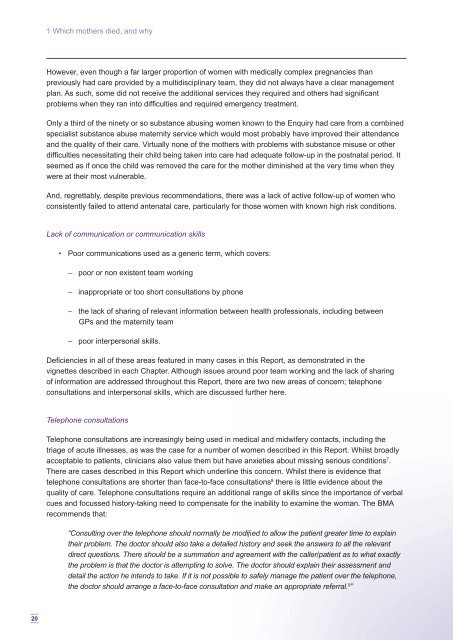Saving Mothers' Lives: - Public Health Agency for Northern Ireland
Saving Mothers' Lives: - Public Health Agency for Northern Ireland
Saving Mothers' Lives: - Public Health Agency for Northern Ireland
You also want an ePaper? Increase the reach of your titles
YUMPU automatically turns print PDFs into web optimized ePapers that Google loves.
20<br />
1 Which mothers died, and why<br />
However, even though a far larger proportion of women with medically complex pregnancies than<br />
previously had care provided by a multidisciplinary team, they did not always have a clear management<br />
plan. As such, some did not receive the additional services they required and others had signifi cant<br />
problems when they ran into diffi culties and required emergency treatment.<br />
Only a third of the ninety or so substance abusing women known to the Enquiry had care from a combined<br />
specialist substance abuse maternity service which would most probably have improved their attendance<br />
and the quality of their care. Virtually none of the mothers with problems with substance misuse or other<br />
diffi culties necessitating their child being taken into care had adequate follow-up in the postnatal period. It<br />
seemed as if once the child was removed the care <strong>for</strong> the mother diminished at the very time when they<br />
were at their most vulnerable.<br />
And, regrettably, despite previous recommendations, there was a lack of active follow-up of women who<br />
consistently failed to attend antenatal care, particularly <strong>for</strong> those women with known high risk conditions.<br />
Lack of communication or communication skills<br />
• Poor communications used as a generic term, which covers:<br />
– poor or non existent team working<br />
– inappropriate or too short consultations by phone<br />
– the lack of sharing of relevant in<strong>for</strong>mation between health professionals, including between<br />
GPs and the maternity team<br />
– poor interpersonal skills.<br />
Defi ciencies in all of these areas featured in many cases in this Report, as demonstrated in the<br />
vignettes described in each Chapter. Although issues around poor team working and the lack of sharing<br />
of in<strong>for</strong>mation are addressed throughout this Report, there are two new areas of concern; telephone<br />
consultations and interpersonal skills, which are discussed further here.<br />
Telephone consultations<br />
Telephone consultations are increasingly being used in medical and midwifery contacts, including the<br />
triage of acute illnesses, as was the case <strong>for</strong> a number of women described in this Report. Whilst broadly<br />
acceptable to patients, clinicians also value them but have anxieties about missing serious conditions 7 .<br />
There are cases described in this Report which underline this concern. Whilst there is evidence that<br />
telephone consultations are shorter than face-to-face consultations 8 there is little evidence about the<br />
quality of care. Telephone consultations require an additional range of skills since the importance of verbal<br />
cues and focussed history-taking need to compensate <strong>for</strong> the inability to examine the woman. The BMA<br />
recommends that:<br />
“Consulting over the telephone should normally be modifi ed to allow the patient greater time to explain<br />
their problem. The doctor should also take a detailed history and seek the answers to all the relevant<br />
direct questions. There should be a summation and agreement with the caller/patient as to what exactly<br />
the problem is that the doctor is attempting to solve. The doctor should explain their assessment and<br />
detail the action he intends to take. If it is not possible to safely manage the patient over the telephone,<br />
the doctor should arrange a face-to-face consultation and make an appropriate referral. 9 ”



